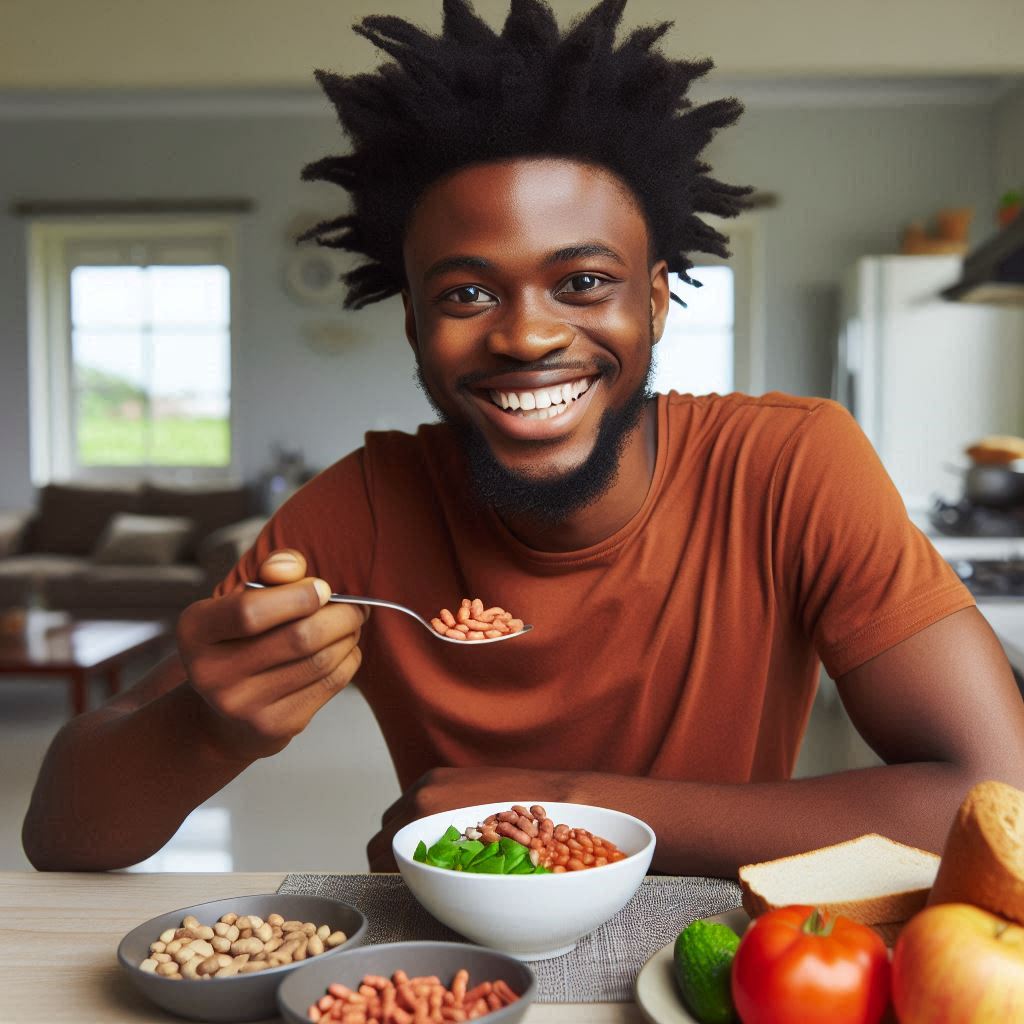Introduction
Preventing anemia with foods rich in iron helps address the condition where the blood lacks enough healthy red blood cells.
This leads to reduced oxygen transport in the body.
In Nigeria, anemia is common, affecting many adults and children.
Factors like poor diet and health issues contribute to its prevalence.
Iron plays a crucial role in preventing anemia.
It is essential for the production of hemoglobin, the protein in red blood cells.
Without adequate iron, the body cannot produce enough healthy red cells.
This can result in fatigue, weakness, and other health complications.
The purpose of this blog is to explore Nigerian foods rich in iron.
By incorporating these foods into their diets, individuals can combat anemia naturally.
Traditional Nigerian diets can offer a variety of iron-rich options, perfect for enhancing overall health.
Understanding Anemia
Anemia is a condition characterized by a deficiency of red blood cells or hemoglobin in the blood.
This deficiency reduces the blood’s capacity to carry oxygen throughout the body.
As a result, individuals with anemia often experience fatigue, weakness, and various other symptoms.
Understanding these symptoms is crucial for early detection and management.
Symptoms of Anemia
- Fatigue and general weakness
- Pale skin and pallor
- Shortness of breath during physical activities
- Dizziness or light-headedness
- Cold hands and feet
- Rapid heartbeat or irregular heartbeat
- Headaches
These symptoms can often go unnoticed or be mistaken for other health issues.
It is essential to consult a doctor if multiple symptoms appear.
Early diagnosis is key to effective management.
Causes of Anemia
While anemia has various causes, iron deficiency is the most common.
Several factors contribute to iron deficiency anemia, including:
- Inadequate dietary intake of iron-rich foods
- Chronic blood loss (e.g., heavy menstruation, ulcers)
- Increased demand during pregnancy or growth phases
- Malabsorption issues in the digestive tract
- Chronic diseases that affect red blood cell production
Each of these factors can lead to a reduced amount of iron available for hemoglobin production.
Consequently, this deficiency impacts the body’s capacity to produce healthy red blood cells.
Anemia Statistics in Nigeria
Anemia is a significant public health issue in Nigeria, affecting millions.
The country faces an alarming rate of anemia, particularly among vulnerable populations.
- Approximately 50% of children under five are affected by anemia.
- About 60% of pregnant women in Nigeria suffer from anemia.
- Rural areas show higher rates of anemia compared to urban areas.
- Malaria, among other factors, exacerbates the anemia situation.
- Poverty and lack of education contribute to nutritional anemia significantly.
These statistics paint a dire picture, emphasizing the need for awareness and intervention.
Addressing anemia, particularly in children and pregnant women, is crucial to ensuring healthy growth and development.
Healthy dietary practices play a vital role in preventing and managing anemia effectively.
Incorporating iron-rich foods into daily meals can significantly lessen the burden of this condition.
Role of Iron in the Body
Importance of iron for blood production and overall health
Iron is a crucial mineral that plays an essential role in human health.
It serves as a fundamental component of hemoglobin, the protein in red blood cells that transports oxygen throughout the body.
Without adequate iron, the production of hemoglobin decreases, leading to reduced oxygen delivery to tissues.
This can cause fatigue, weakness, and impaired immune function.
Moreover, iron is vital for several bodily functions, including:
- Energy Production: Iron aids in the conversion of food into energy.
- Cognitive Function: It plays a role in neurotransmitter function, affecting memory and concentration.
- Immune Response: Iron contributes to a well-functioning immune system.
- DNA Synthesis: It is necessary for synthesizing DNA, the genetic material in all cells.
Types of iron: heme vs. non-heme iron
Iron exists in two primary forms: heme and non-heme iron.
Understanding these types helps improve dietary choices.
- Heme Iron: Found primarily in animal sources, such as meat, fish, and poultry.
Heme iron is more easily absorbed by the body, making it an efficient source for maintaining adequate iron levels. - Non-Heme Iron: Present in plant-based foods such as leafy greens, legumes, and grains.
This type of iron is not as readily absorbed, but it remains a vital component of a balanced diet, especially for vegetarians and vegans.
To enhance the absorption of non-heme iron, consider pairing it with vitamin C-rich foods, such as citrus fruits, tomatoes, and bell peppers.
This combination can significantly increase the amount of iron your body absorbs.
Overview of the recommended daily iron intake per age group
The recommended dietary allowance (RDA) for iron varies based on age, gender, and life stage.
Below is a simplified overview to guide dietary choices:
Unlock the Power of Nigerian Food Minerals
Discover personalized Food Advisory tailored to boost your health or business using expert insights on Nigerian minerals.
Get Started- Infants (0-6 months): 0.27 mg/day
- Children (1-3 years): 7 mg/day
- Children (4-8 years): 10 mg/day
- Adolescents (9-13 years): 8 mg/day for boys, 15 mg/day for girls
- Adults: 8 mg/day for men; 18 mg/day for women (19-50 years), 8 mg/day for women (51+ years)
- Pregnant women: 27 mg/day
- Lactating women: 9-10 mg/day
It is vital to consult a healthcare professional to tailor these recommendations based on individual health circumstances.
In fact, understanding the role of iron in the body is key to preventing anemia and promoting overall health.
By including foods rich in both heme and non-heme iron, individuals can maintain optimal iron levels and support bodily functions effectively.
Read: Prevent Diseases With Mineral-Rich Nigerian Foods
Top Nigerian Foods Rich in Iron
Preventing anemia is crucial for maintaining good health.
Consuming foods rich in iron can effectively combat this condition.
Nigerian cuisine offers a variety of iron-rich foods.
Each of these foods has unique nutritional profiles.
They can help you meet your daily iron requirements naturally.
Below, we explore some top Nigerian foods high in iron.
Beans
Beans are an excellent source of plant-based iron.
They are versatile and nutritious.
Different varieties of beans are common in Nigerian kitchens.
Notable examples include black-eyed peas and kidney beans.
- Black-eyed peas: These legumes are rich in iron, protein, and fiber.
They offer about 3.5 mg of iron per cooked cup. - Kidney beans: Kidney beans provide about 3.9 mg of iron per cooked cup.
They are also packed with antioxidants and are heart-healthy.
Incorporating beans into your diet can enhance your iron intake.
You can prepare them in various dishes, such as stews and soups.
They are hearty and filling, making them a staple food in many homes.
Dark Leafy Greens
Dark leafy greens are rich in iron and other essential nutrients.
They are nutrient-dense and low in calories.
Common leafy greens in Nigeria include spinach and ugu.
- Spinach: Spinach contains about 6.4 mg of iron per cooked cup.
It also provides vitamins A, C, and K. - Ugu (fluted pumpkin leaves): Ugu is a highly nutritious green.
It offers approximately 3 mg of iron per cooked cup.
You can enjoy dark leafy greens in salads, soups, or steamed.
Flavor them with spices for added taste.
Regular consumption of these greens can significantly improve your iron levels.
Meat
Meat is another vital source of iron.
Animal-based iron (heme iron) is more easily absorbed by the body.
Various meats are popular in Nigerian cuisine, including goat, beef, and liver.
- Goat meat: Goat meat provides about 2.7 mg of iron per cooked 100 grams.
It is also lean and flavorful. - Beef: Beef is one of the richest sources of iron, offering about 2.6 mg per 100 grams.
It also contains high-quality protein. - Liver: Liver is exceptionally high in iron.
A single serving can provide over 6 mg of iron.
Meat can be prepared in various ways, such as grilling, boiling, or stewing.
Using spices and herbs can enhance the flavors.
Including meat in your meals ensures you’re getting enough iron.
Seafood
Seafood is not only delicious but also rich in iron.
Different types of fish serve as excellent sources of iron.
In Nigeria, sardines and other local fish varieties are commonly consumed.
- Sardines: Sardines are packed with iron, providing up to 2.5 mg per 100 grams.
They are also high in omega-3 fatty acids. - Other fish: Many other fish varieties, such as mackerel, also offer significant iron content.
You can enjoy seafood fresh, grilled, or in stews.
The versatility of fish allows it to adapt to different culinary styles.
Including fish in your weekly meals can boost your iron intake.
Nuts and Seeds
Nuts and seeds are excellent sources of iron.
They are also rich in healthy fats and proteins.
Incorporating these foods into your diet can enhance your iron levels.
- Sesame seeds: Sesame seeds are particularly high in iron, providing up to 14.55 mg per 100 grams.
They also contain calcium, magnesium, and fiber. - Tiger nuts: Tiger nuts are nutrient-dense.
They contain about 3.5 mg of iron per 100 grams and are also high in fiber.
Nuts and seeds can be enjoyed as snacks or added to meals.
Sprinkle them on salads or incorporate them into baked goods.
Their crunchy texture adds variety to your meals.
Captivate Your Audience with Exclusive Nigerian Food Content
Imagine your platform enriched with unique, mineral-rich Nigerian cuisine stories that no one else can offer. Let's create content that resonates deeply and sets you apart.
Get StartedCombining Foods for Better Iron Absorption
While consuming iron-rich foods, it’s essential to enhance their absorption.
Pairing iron-rich foods with vitamin C sources can improve absorption significantly.
Examples of vitamin C-rich foods include:
- Citrus fruits like oranges and grapefruits
- Bell peppers
- Tomatoes
- Broccoli
For instance, enjoy a spinach salad with tomatoes.
Adding lemon juice can boost your iron absorption.
Combining beans and rice creates a complete protein and enhances iron uptake.
Preventing anemia naturally is achievable with the right dietary choices.
Incorporate a variety of iron-rich Nigerian foods into your meals.
Beans, dark leafy greens, meat, seafood, and nuts all play significant roles.
By consuming these foods regularly and combining them wisely, you can maintain optimal iron levels.
Remember, a balanced diet is essential for overall health.
Consider consulting a healthcare professional for personalized dietary advice.
Read: How to Address Mineral Deficiencies in Your Nigerian Diet
Complementing Iron Sources with Vitamin C
Iron is an essential mineral that plays a vital role in our health.
It assists in the production of hemoglobin, which carries oxygen in the blood.
Unfortunately, many people, especially in Nigeria, suffer from anemia due to insufficient iron intake.
To combat this problem, it’s crucial to ensure adequate iron absorption.
Combining iron-rich foods with vitamin C can enhance the absorption of iron, making it a potent duo in preventing anemia naturally.
How Vitamin C Enhances Iron Absorption
Vitamin C, also known as ascorbic acid, significantly enhances the absorption of non-heme iron, the type of iron found in plant-based foods.
When consumed together, vitamin C transforms iron into a more soluble form, facilitating its uptake in the intestines.
This transformation is especially important for individuals following a vegetarian or vegan diet.
Furthermore, vitamin C helps reduce the effects of phytates and polyphenols, compounds in some plant foods that inhibit iron absorption.
Combining vitamin C-rich foods with meals can dramatically increase iron levels in the body.
Research indicates that the addition of vitamin C can increase iron absorption by more than 2.5 times.
This fact highlights the importance of pairing nutrient-dense foods in our diet, especially for those at risk of anemia.
Nigerian Fruits and Vegetables High in Vitamin C
Nigeria is home to a variety of fruits and vegetables that are rich in vitamin C.
Including these in your daily diet can greatly boost your iron levels.
Here’s a list of some readily available Nigerian foods packed with vitamin C:
- Oranges: These juicy fruits are a great source of vitamin C.
They add a refreshing taste to any meal or snack. - Guavas: Guavas are not only rich in vitamin C but are also delicious and versatile for various dishes.
- Papayas: This tropical fruit is sweet, vibrant, and loaded with vitamin C, making it an excellent addition to any diet.
- Peppers: Bell peppers, especially the red variety, are incredibly high in vitamin C.
Adding them to your meals enhances flavor and nutrition. - Spinach: While low in vitamin C compared to fruits, spinach provides a respectable amount.
It’s also high in iron, making it a double whammy for nutrition. - Kale: Similar to spinach, kale is full of iron and offers a good dose of vitamin C, perfect for salads and stews.
Suggestions for Combining Vitamin C-Rich Foods with Iron-Rich Meals
To make the most of your diet, consider these practical tips for combining vitamin C-rich foods with iron-rich meals:
- Fruit Salads: Create a vibrant fruit salad incorporating oranges or guavas.
Enjoy this with your rice and beans for an enhanced iron absorption experience. - Smoothies: Blend spinach or kale with papayas or oranges for a nutritious smoothie.
This snack is perfect post-workout or as a meal supplement. - Peppered Stews: Utilize red bell peppers in your meat or fish stews.
This addition provides vitality while boosting iron absorption. - Dips and Sauces: Make a spicy tomato and pepper sauce,which goes well with whole grain or plant-based foods.
This combo can be served with yam, plantains, or vegetables. - Side Dishes: Pair steamed vegetables like broccoli, carrots, or peas dressed with citrus-based sauces alongside legumes.
This pairing significantly improves iron uptake. - Juices: Drink fresh orange juice with iron-rich meals.
It’s a simple yet effective way to enhance nutrient absorption.
Implementing these combinations into your diet can significantly reduce the risk of anemia and boost overall health.
Failure to absorb sufficient iron negatively affects energy levels, which can impact daily activities and quality of life.
Therefore, consider making vitamin C-rich foods a staple in your meals to maximize iron intake.
In short, enriching your diet with a combination of iron-rich Nigerian foods alongside vitamin C-rich fruits and vegetables can greatly enhance your iron absorption.
Pairing these foods not only helps prevent anemia but also supports overall health and vitality.
With the availability of these nutrient-packed options in Nigeria, you can easily integrate them into your daily meals.
Remember that a little planning and knowledge can lead you down the path to improved wellness.
Consequently, you can enjoy the vibrant flavors of Nigerian cuisines while enhancing your health naturally.
Read: Amazing Health Benefits of Minerals in Nigerian Diets

Traditional Nigerian Dishes that Boost Iron Intake
Iron is a vital mineral that plays an essential role in many body functions.
It helps form hemoglobin, which transports oxygen in the blood.
Preventing anemia naturally with food is easier than many think, especially with the richness of Nigerian cuisine.
Below, we explore various traditional dishes that not only provide delectable flavors but also incorporate iron-rich foods, helping to boost your iron intake.
Efo Riro (Vegetable Soup)
Efo Riro is a classic Nigerian soup known for its richness in vegetables and proteins.
Spinach, a primary ingredient, is packed with iron, making this dish an excellent choice for those aiming to increase iron levels.
This vibrant dish typically includes the following ingredients:
- Spinach or any dark leafy green
- Green bell peppers
- Ground crayfish
- Palm oil
- Meat (beef, goat, or chicken)
- Onions
- Seasoning cubes
To prepare Efo Riro, start by blending the green bell peppers and onions.
Sauté your meat in palm oil, add the blended mixture, and let it simmer.
Finally, fold in the spinach and crayfish, allowing everything to meld beautifully.
Serve with swallow like pounded yam or fufu for a fulfilling meal.
Moi Moi (Steamed Bean Pudding)
Moi Moi is a savory pudding made from blended black-eyed peas, known for its rich nutrient profile.
Black-eyed peas are high in iron and protein, promoting healthy energy levels and good blood circulation.
Here’s how to make a delicious Moi Moi at home:
- Black-eyed peas (soaked and peeled)
- Vegetable oil
- Onions
- Bell peppers
- Seasoning cubes
- Salt
- Optional ingredients: egg, fish, etc.
Begin by blending the soaked beans with onions and bell peppers until smooth.
Transfer the mixture to a bowl, add seasoning, and incorporate any optional ingredients.
Steam the mixture in molds until fully set.
Moi Moi can be enjoyed alone or as a side dish with rice.
Ayamase (Green Pepper Sauce with Meat)
Ayamase, also known as designer stew, is a spicy, green pepper sauce that is typically paired with rice or yams.
The primary ingredient, green bell pepper, is rich in various vitamins and iron, making it an excellent addition to your diet.
Here’s a simple recipe for Ayamase:
- Green bell peppers (hot and sweet varieties)
- Onions
- Meat of choice (beef, chicken, or goat)
- Palm oil
- Seasoning cubes
- Salt
To prepare Ayamase, blend the green bell peppers and onions together.
Cook your choice of meat until tender.
Add the blended mixture to the pot and allow it to simmer.
Mix in the palm oil, seasoning, and salt to taste.
Serve hot with rice or yams for a nutritious meal.
Cooking Tips for Retaining Nutritional Value
When cooking traditional Nigerian dishes, it’s crucial to retain the nutritional value of iron-rich ingredients.
Here are some valuable tips:
- Avoid Overcooking: Overcooking vegetables can lead to a loss of nutrients.
Cook them just until they are tender. - Use Minimal Water: Use only the necessary amount of water during cooking.
This helps to preserve water-soluble vitamins. - Pick Fresh Ingredients: Fresh vegetables and meat ensure high levels of nutrients.
Choose seasonal produce for the best options. - Add Acidity: Incorporating a little lemon or lime juice can enhance iron absorption when consuming iron-rich foods.
- Pair with Vitamin C: Combining iron-rich foods with Vitamin C-rich foods, like tomatoes or peppers, boosts iron absorption further.
By including these traditional recipes in your diet, you can enhance your iron intake naturally.
These dishes are not only hearty and flavorful but also beneficial for maintaining healthy iron levels and preventing anemia.
Cooking traditional Nigerian dishes is not just a culinary experience but also a means to promote health and wellness.
By focusing on iron-rich meals like Efo Riro, Moi Moi, and Ayamase, you can make significant strides in preventing anemia naturally.
With mindful cooking techniques and ingredient selections, you ensure that your family enjoys both delicious meals and the health benefits they provide.
Embrace the richness of Nigerian cuisine while taking control of your iron intake.
Read: Discover the Essential Mineral Profiles of Nigerian Foods
Lifestyle and Dietary Tips for Preventing Anemia
Importance of Regular Consumption of Iron-Rich Foods
Iron plays a crucial role in the body. It helps form hemoglobin, which transports oxygen in the blood.
A lack of iron leads to anemia, fatigue, and weak immunity.
Therefore, regular consumption of iron-rich foods becomes essential for maintaining health.
Nigerian diets often lack sufficient iron, leading to higher anemia rates.
Incorporating iron-rich foods daily can make a significant difference.
Good sources include red meat, leafy vegetables, and legumes.
Consuming these foods regularly helps to replenish any lost iron.
Here are some reasons why eating iron-rich foods is vital:
- Maintains healthy oxygen transport in the body.
- Supports energy levels and reduces fatigue.
- Strengthens the immune system against infections.
- Promotes better cognitive function.
- Enhances physical performance, especially in athletes.
Recommendations on Meal Planning and Incorporating a Variety of Iron Sources
Meal planning can help in effectively preventing anemia.
Including various iron-rich foods ensures that you meet your daily iron needs.
It also adds diversity to your diet.
To maintain a balanced intake of iron, consider these suggestions:
- Include two to three servings of red meat weekly.
- Incorporate legumes such as beans and lentils into your meals.
- Add leafy green vegetables like spinach and kale to your dishes.
- Include nuts and seeds, which can serve as snacks or meal toppings.
- Consume fortified cereals or grains for an added iron boost.
When planning meals, think about pairing iron-rich foods with vitamin C-rich items.
This combination enhances iron absorption dramatically.
For instance, serving beans with tomatoes or citrus fruits can maximize benefits.
Consider these meal ideas:
- Stewed beans with a side of sautéed spinach and tomatoes.
- Red meat stir-fry with bell peppers and broccoli.
- Whole grain cereal topped with sliced oranges.
- Lentil soup garnished with fresh parsley and lemon juice.
- Quinoa salad mixed with chickpeas and diced mangoes.
Don’t forget to prepare snacks such as roasted chickpeas or trail mix containing nuts and seeds.
They make healthy, iron-rich choices between meals.
Cooking Methods and Their Impact on Iron Content
The cooking method can significantly influence the iron content of foods.
Certain techniques may either preserve or decrease iron levels.
Understanding these methods can help you make smarter cooking choices.
Here are some cooking practices to maximize iron retention:
- Use cast-iron cookware for better iron absorption in foods.
- Avoid prolonged boiling, as it may leach out nutrients.
- Steam vegetables instead of boiling them to preserve nutrients.
- Soak legumes before cooking to reduce cooking time and enhance digestion.
- Opt for quick grilling or roasting over frying to limit added fats.
Be aware of certain foods that can inhibit iron absorption, too.
For instance, polyphenols in tea and coffee can bind to iron and reduce absorption.
Therefore, consume these beverages separately from iron-rich meals.
Finally, embrace traditional Nigerian cooking methods, which often highlight iron-rich ingredients.
Dishes like jollof rice with lean beef, or egusi soup with spinach, not only provide iron but also offer a wealth of nutrients.
Choose to prepare meals that reflect traditional flavors yet enhance your iron intake.
Conclusion
Preventing anemia is crucial for maintaining good health.
Anemia can lead to fatigue, weakness, and decreased quality of life.
A balanced diet rich in iron supports the production of red blood cells.
Incorporating iron-dense foods is an effective solution for this common deficiency.
Nigerian cuisine is rich in many iron sources.
Foods like beans, spinach, and liver can significantly boost iron intake.
By exploring local ingredients, you can enhance your meals and overall health.
Diverse dishes featuring these foods can provide essential nutrients, preventing anemia naturally.
Make a habit of including iron-rich foods in daily meals.
Try cooking stews with melanin-rich vegetables or serving beans as a staple.
Experimenting with recipes can make your diet enjoyable and nutritious.
Simple changes in meal planning can yield long-term health benefits.
As you consider your dietary choices, remember that prevention is key.
By being proactive, you can protect your body from deficiencies.
Invest in your health by making informed decisions about your food intake.
Start today by incorporating more iron-rich Nigerian foods into your diet.
Your health is in your hands. Embrace the variety of options available within Nigerian cuisine.
A wholesome diet adapting local foods helps in promoting overall well-being.
Every small change contributes to significant improvements in health.
Prioritize your nutrition to thrive and prevent anemia.
Take charge of your health through natural dietary choices.
A balanced intake of iron-rich foods fosters a healthier lifestyle.
Together, let’s work towards a community free from the threat of anemia.




